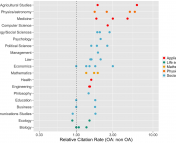Introduction
As graduate admission season approaches, I thought I’d tackle a question that often comes up with prospective grad students: what types of grad programs should I consider?

If you’re like me, you might feel like this when thinking about different types of grad programs. (Source: phys.org)
This might sound like an easy question—you might think if you’re interested in astro, you should just apply for astronomy programs. But it’s often not that simple. There’s quite a lot of overlap between astronomy and physics departments—and sometimes other departments too! For example, exoplanet scientists might work in planetary/earth science departments, or people in applied math departments might study astrophysical fluid dynamics. Some astronomers even work in engineering departments!
I didn’t know any of this when I was starting to apply for grad programs. I knew I wanted to do research in astronomy. But I’d spent my undergrad in a traditional physics department, and even the astrophysics professors in the department didn’t know as much about astronomy programs.
So with the benefit of hindsight, here are some things that I wish I’d known back when I was applying to grad school:
- The main differences between grad programs in astro, physics, math, and planetary sciences are the program requirements.
In the US, these generally include coursework and qualifying exams. Astronomy grad programs will require you to take courses and pass exams on topics like radiation, the interstellar medium, stars, and galaxies. Physics grad programs will require you to take courses and pass exams on classical mechanics, electromagnetism, and quantum mechanics. Math (even applied math) programs tend to be flexible, but may require coursework in certain core areas, such as real and complex analysis or numerical analysis. Finally, planetary/earth sciences departments often require courses about planetary physics and chemistry.
So, it’s worth looking up the requirements for a given program and asking yourself: Are these courses/exams going to help me in my research? Are they going to help me become the scientist I want to be? If, like me, you get hives when you think about studying electromagnetism from Jackson, maybe you should just save yourself the trouble (and application fees) and not apply to physics programs.
Some side notes:
- Many universities have combined “physics and astronomy” departments. These often have separate “tracks” with different coursework/exam requirements. This is also common among earth sciences departments, so that a planetary science track and a geology track have different requirements.
- Note that coursework requirements may differ outside the US. In the UK and many other countries, PhD programs do not include coursework. Instead, master’s-level coursework is a prerequisite to applying for PhD programs; in this case, it’s generally assumed that this coursework is relevant to the program to which you’re applying.
- The application requirements might also differ from department to department. For example, many planetary science programs don’t require you to take Physics GRE, while astronomy programs may or may not. (While some astro departments are moving away from this requirement for many reasons, many still have it. For most US astro-related programs, you can check this spreadsheet to see what their stance is on the Physics GRE.) Physics programs almost always require the Physics GRE, while math programs require the Math GRE. Unfortunately, a vast majority of grad programs in all disciplines require the General GRE.
- You can do research in a different department.
If you’re still not sure, don’t worry! You might be able to work with a professor in one department while being in another department. This might not be a great plan to commit to when you’re applying—departments might question your passion for their field if they know you’re just going to end up working in another department. It’s possible that you might also end up at the bottom of the list funding-wise for both departments, since both will prioritize their own students over someone who’s not really in either field. But it’s certainly not uncommon for students to do this, particularly if you have your own funding (like the NSF GRFP).
Nearly all astro-related degrees are versatile, too, so don’t worry about the name of the program affecting your future prospects. The name of your degree won’t matter much in the long run, whether or not you stay in academia.
- Different universities treat interdisciplinary applications differently.
Some programs will simply reject you outright if they think you’ve applied to the wrong program. Other universities will allow you to apply for multiple programs, or allow you to specify a second choice program if your first choice doesn’t work out. Some universities understand that their department/division/lab group structure is really complicated, and they might transfer your application to the appropriate institute if they feel you’re a better fit elsewhere.
Unfortunately, most universities won’t tell you how they handle these kinds of applications. One way to check is to just start an application! You can skip through the application and see if it asks you about first or second choice programs.
Conclusion
Astronomy is an interdisciplinary subject, so strict delineations between fields (and departments) are often artificial. Hopefully this has clarified some of these distinctions for you!
Just remember that, when possible, it’s best to research individual programs and only apply for the ones that seem like good fits for you.





Thank you Mia for this article. I recently went through the application process to graduate schools with the goal to do Astronomy research.
The diversity of options can be quite overwhelming (which is a good thing I think), and also I had to consider a diverse set of advice from students, stuff, faculty and family about different programs (sometimes conflicting :)).
Yes, it’s quite true, the types of programs you can get involved with are quite diverse, especially if you also consider the ones abroad. I found it fascinating, because the application process allowed me to get to know about amazing astronomy researchers, wonderful schools, research programs, institutes, groups, observatories. Isn’t it the best time to study Astronomy? (Just in case a reader is new to this field, AAS job register website has a spot for international PhD application calls in the field of Astronomy).
For example, one school in UK had advertised PhD programs in Data Science, which used Astronomy Research Data sources – pretty cool and highly transferable skills 🙂
I come from a university were few people go on to do PhDs, and if I might add, the two resources that worked for me were 1) like you mentioned, reaching out to people and talking with them about their programs and 2) talking with students and professors at the graduate school tables at the PHYSCON and AAS conferences that I had the fortune of attending.
Another thing that would happen during my application process, is that Universities would change their websites or even application requirements, especially regarding the GRE Physics, so I encourage students to check back those websites throughout the application cycle for updates and news regarding the admission requirements.
I hope this helps to some students who are considering graduate schools and who hail from non-research schools like me 🙂
Good luck to all of the applicants of Fall 2017 wave 🙂
P.S. On that note, I also did not know that you had to sign up for GRE Physics about a month in advance, and it is not cheap, so make sure you plan on that (Some schools offer GRE Fee Reduction certificate for students on Financial Aid). If you are taking GRE Physics in October, the deadline is in September, as an example. On the other hand, General GRE test is offered quite frequently and does not have long wait times. Both these are for US students within the country.
P.P.S. While many of the schools abroad require a Master’s as a prerequisite, I met one person who was admitted to an Australian PhD program without a Master’s, so maybe there are some exceptions to this.